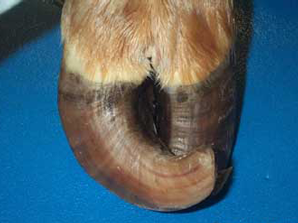 Glenn Selk, Oklahoma State University Emeritus Extension Animal Scientist
Glenn Selk, Oklahoma State University Emeritus Extension Animal Scientist
Corkscrew claw is a defect that causes severe lameness in cattle and is most often observed in cattle over 3 years of age. This is a condition that most commonly occurs on the hind legs. Corkscrew claw (also called screw claw) is a twisting of the toe in a way that places the side wall of the hoof in direct contact with ground. The condition often begins to show itself with toes pointing inward instead of forward and leads to lameness due to improper distribution of weight within the toe.
Corkscrew claw may be confused with founder. Have your veterinarian look at any cow or bull with poorly shaped or overgrown toes. A correct diagnosis could be important as to the culling of that particular animal or any of its offspring.
The genetic component of corkscrew claw seems to be a subject of some debate. One study in dairy cattle reported a low heritability of the condition. However, that same study noted that there was sizeable difference in breeds as to the incidence of screw claw. Beef cattle veterinarians occasionally report that the condition is much more prevalent in some herds and relationships can be traced back to a certain bull that was used in that herd. The American Association of Bovine Practitioners Fact Sheet An Approach to Corkscrew Claw includes a bullet statement:
Regarded as being a heritable trait. The use of animals as breeding stock showing characteristic signs of CC (corkscrew claw) at a young age should be discouraged.
Although this condition may not be manifest in young cattle (when they are purchased for seedstock), it still makes good sense to watch for any signs of corkscrew claw when buying bulls, replacement heifers, or replacement cows. Culling cows or bulls that are diagnosed with this condition, as well as their heifer offspring should reduce the incidence of the problem for your herd.
